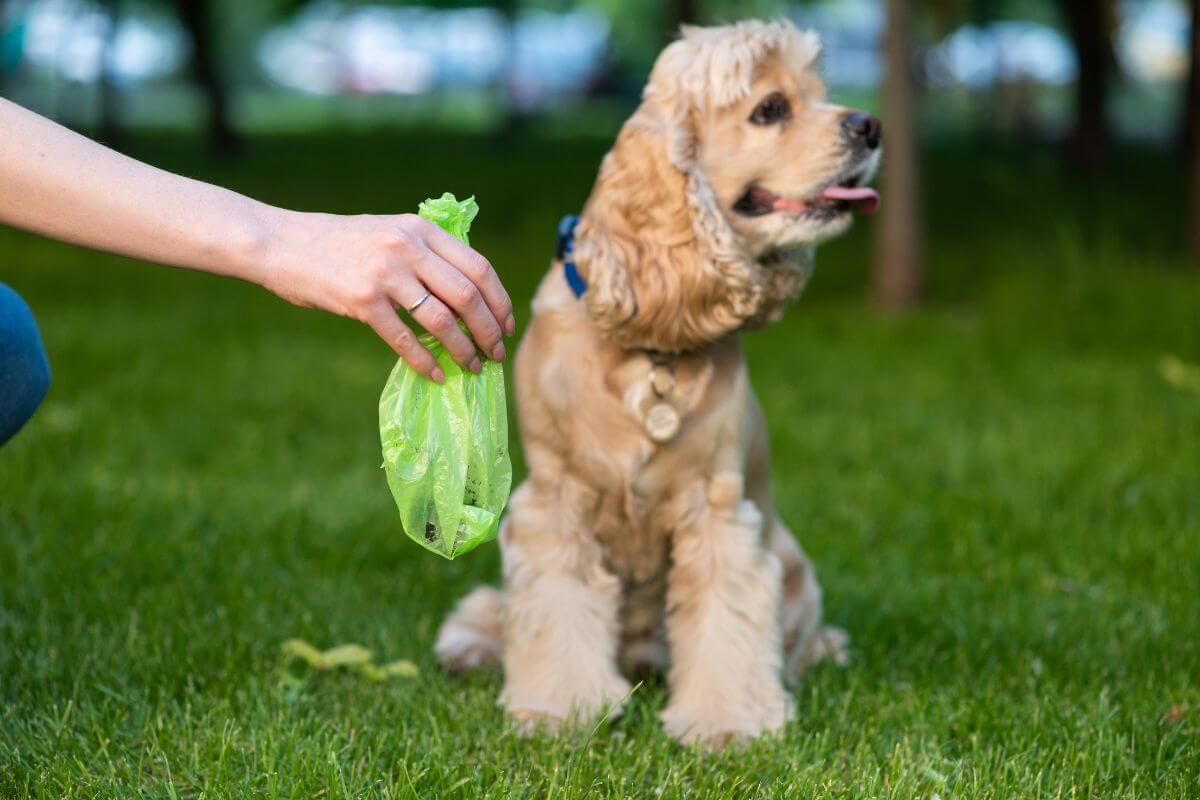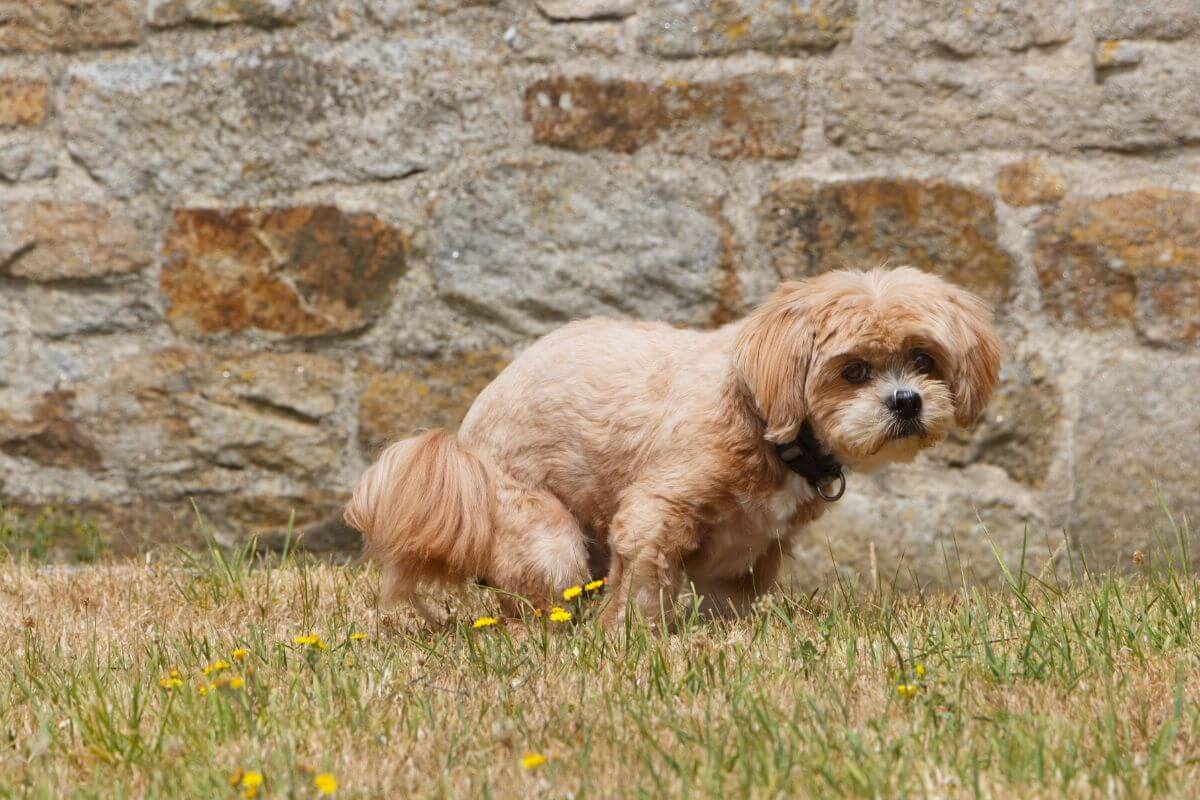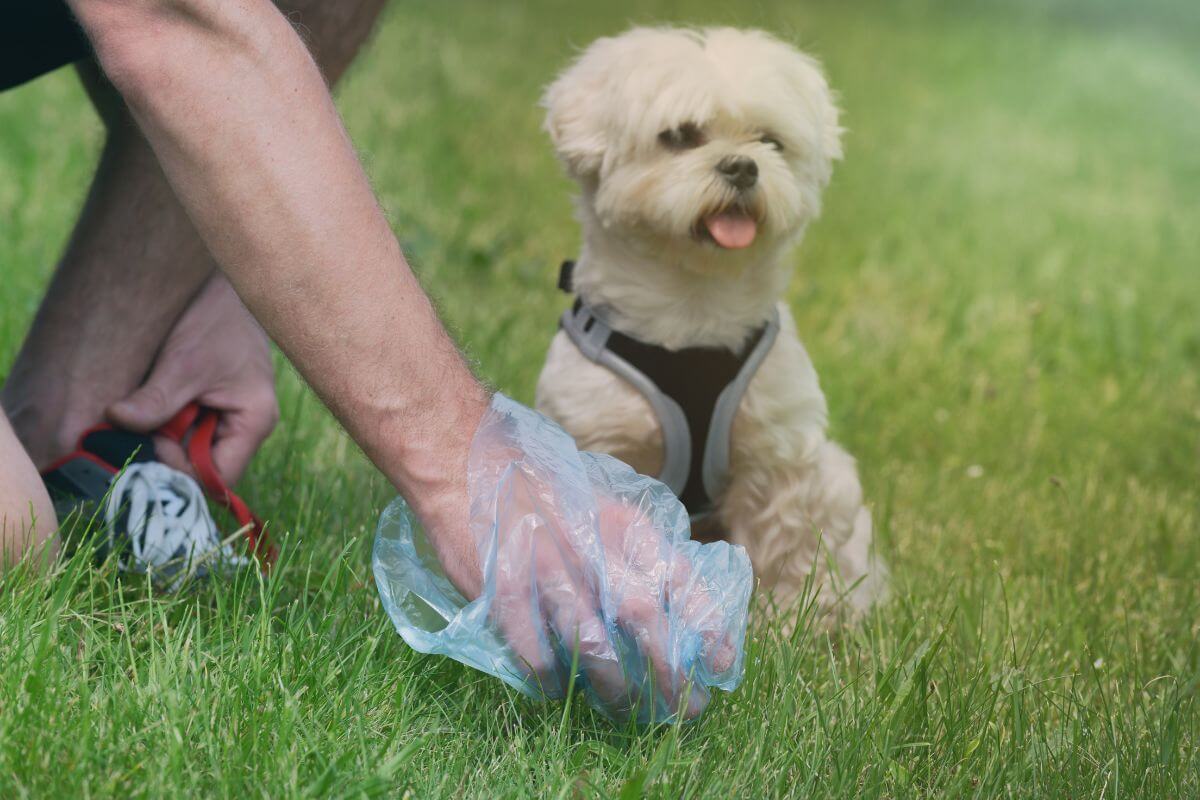Have you ever wondered if you can compost dog poop? Well, the answer is yes!
More and more people are composting for the positive environmental impact. There are also many benefits to composting dog poop, including reducing pollution, saving money, and improving the environment.
Continue reading to learn more about the benefits and dangers of composting dog poop.
Can You Compost Dog Poop?

Any organic material is indeed compostable, and dog poop and other pet waste are organic materials.
There has been a bit of a backlash to plastic dog poop bags in recent years. The idea of gathering up biodegradable material (pet poop) and putting it in a non-biodegradable bag seems counterintuitive.
There are now biodegradable poop bags on the market, and people are now taking to moving their dog’s waste into the undergrowth and off paths, so it can decompose naturally without the risk of anyone stepping in it.
As this is fine in the great outdoors, you may be wondering if you can compost your dog’s poop at home. While technically you can compost dog feces, it contains many harmful bacteria and pathogens that you may not want to encounter in your regular compost piles.
Dogs are omnivores and it is the meat part of their diet that can cause issues when composting their poop.
Benefits of Dog Poop

Dog poop is an excellent source of nitrogen for plants and soil. This means that it will help improve plant growth, increase yields, and make plants healthier.
Other than the nitrogen content, the nutritional benefit of dog poop is relatively low. However, with 48,255,413 American households keeping dogs as pets, the ecological benefit is the primary motivation behind composting dog waste.
Dangers of Dog Poop
Dog poop can contain a host of unpleasant bacteria and parasites, including worms. Five types of worms can be found in dog waste, with roundworm remaining infectious in soil for years.
Dog poop can also host around 23 million harmful bacteria that can cause intestinal illnesses, dehydration, cramps, diarrhea, and kidney disorders in humans.
It is not hard to see why many people don’t compost their dog’s waste with all of these downsides. But this doesn’t mean it can’t be done.
Composting dog poop just takes more time, determination, and a bit more effort. Follow the tips below for a safe dog waste compost heap.
How to Compost Dog Poop

Many gardeners will maintain that the benefit of home composting dog poop does not make up for the dangers. Nevertheless, you may feel that the ecological aspect of it is worth the extra effort.
If you want to compost your dog’s waste, I’ve listed the steps you need to take to do it safely.
1. Start a separate compost bin for dog waste
Some people say it’s fine to put dog poop in your regular compost heap, but I would keep my dog waste out of the composter that I use for everything else.
Having a separate compost bin ensures that there will be enough time for the dangerous parasites and disease-causing pathogens to be killed before using the compost in your garden.
When choosing a composting location, be sure to keep it away from your food gardens because of the potential bacteria spreading.
Some people say that compost made from dog poop can be usable in as little as six months by using hot composting methods. However, there is no guarantee that your compost will reach the heat levels required to completely kill off any harmful pathogens and parasites.
If you are using the compost for vegetable and edible gardens, then I would say it’s best to be extra careful. Also, if you turn your compost often, you won’t know if you are mixing fresh dog poop into your finished compost, and you risk cross-contamination.
2. Add a layer of sawdust or wood chips each time you add dog poop into your composter
For good decomposition, organic waste in the compost heap needs a balance of oxygen, water, and heat in its environmental conditions.
Due to the high nitrogen content of dog poop, decomposition can happen very quickly, resulting in a foul-smelling mess that may never become usable compost. Adding brown materials with your dog poop will absorb the potential smell.
Layering brown material on top of the dog poop will absorb the excess moisture and slow down the decomposition to help you get some decent compost.
Having a good balance of greens and browns in your compost mixture will help create healthy compost.
3. Be patient during the composting process
It will take time for any parasites and bacteria to be killed, so you should leave your dog poop to compost for as long as you can. This is the main reason for having a separate compost bin specifically for dog poop.
Most commercially available compost bins are enclosed with a lid and a hatch in the bottom for you to extract the compost. These are the best type for composting dog poop as it will get pretty smelly, so the more enclosed it is, the better (here is an example of one).
When composting dog poop, you need to access the older poop without worrying about it being contaminated by the fresh feces, so it’s best that you don’t turn your dog poop compost.
As it takes so long before the poop is entirely safe to use, you may want to purchase two bins. This way, you can leave one to “cook” while you fill up the new one.
Composting Dog Poop Final Thoughts
All in all, dog poop can make great compost. It just takes patience and planning to ensure that you have a safe and effective method of composting it.
Remember, it’s also best not to use pet waste compost for edible plants like fruit trees. Use dog and cat compost with flower beds and other non-edible gardens.
Check out these other composting articles on different ingredients:
- What Materials are Compostable
- What Materials are Not Compostable
- Composting Bread
- Composting Cat Poop and Cat Litter
- Composting Cheese and Dairy Products
Composting Dog Poop FAQs
Does dog poop go in compost or garbage?
Dog poop can go in both compost and garbage. Compost is made from organic matter such as food and kitchen scraps, grass clippings, paper, cardboard, and other yard waste. Dog poop can be dangerous in compost because it contains bacteria that can be harmful to edible plants and eventually to humans. It’s ideal to have a separate compost bin for pet waste and to use the finished compost for non-edible plants and gardens.
How long does it take to compost dog poop?
Dog poop takes anywhere from 6 to 18 months to decompose completely. Depending on the size of your pile, this process usually takes longer. It is recommended that you wait until the smell dissipates before using the composted dog poop. Allowing the longer time for decomposition, the harmful bacteria will also be killed off.
Is dog poop biodegradable?
Yes, dog poop is biodegradable and can be composted. Dog poop is one of the most common household wastes. Dog feces are rich in nitrogen, too, so you’ll want to be sure you balance it with carbon-rich, brown materials. Composting cardboard and other paper products would be good to layer on.
Can dog poop be used as fertilizer?
No, dog food should NOT be used as fertilizer because it contains harmful bacteria and pathogens which can harm your plant life. Dogs also like to eat meat, so dog feces will contain more pathogens from the meat. If you do decide to fertilize your garden with dog poop, then only apply it after the compost has been turned into soil. Never use fresh dog poop as it’s when the bacteria levels are at its highest.
Can you compost dog poop with worms?
Yes, dog poop can be composted with worms in a vermicompost. Worm composting works well for dog waste. Just place the feces in a container with a layer of dirt and cover with another layer of dirt. Add enough worms to eat everything. Worms love eating dog poop. After a few weeks, you’ll notice that the smell will dissipate. The worms will continue to eat the feces until nothing remains. Remember that it’s best to not use the compost for edible plants though as dog poop may contain certain pathogens that are not safe.


